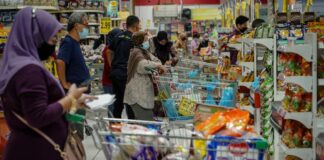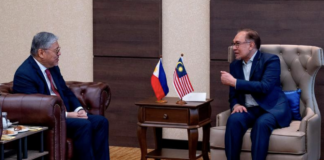KUALA LUMPUR, July 9 — AirAsia Group Bhd, which plans to shore up liquidity to ensure sufficient cash flow, has received indications of support from certain financial institutions in its request for funding, amounting to more than RM1 billion.
In a statement, AirAsia Group chief executive officer Tan Sri Tony Fernandes said the airline has been presented with proposals in various forms of capital raising, be it debt or equity.
“We are in ongoing discussions with numerous parties, including investment banks, lenders, as well as interested investors in seeking a favourable outcome for the group,” he said.
Of the RM1 billion debt funding, a certain portion he said, would be eligible for the government guarantee loan under the Danajamin PRIHATIN Guarantee Scheme in Malaysia.
Fernandes said its Philippine and Indonesia entities were currently in various stages of applications for bank loan.
In the Philippines, AirAsia has applied for the government-guaranteed loan under the Philippine Economic Stimulus Act (PESA), with an expected positive outcome.
Commenting on capital management, internally said Fernandes, the group has embarked on headcount rationalisation for leaner operations, given the current demand for air travel and expectations on recovery, with internal cost-cutting efforts include a group-wide temporary salary reduction of between 15 per cent and 75 per cent.
“We have received deferrals from our supportive lessors and are now working on further extensions. We have also restructured 70 per cent of our fuel hedging contracts and are continuously negotiating with our supportive counterparties for the remaining exposure.
“All in all, we expect at least 50 per cent reduction in our cash expenses in 2020,” he said.
While the first half of the year has been extremely challenging, however, he said countries around the world have resumed domestic travel in recent weeks and are gradually reopening international borders.
In this regard he said, the formation and discussion of “travel bubbles” and “green lanes” with key economic partners with a low infection rate and proven pandemic curbing systems, is a step in the right direction.
AirAsia has also resumed its domestic operations in markets such as Malaysia, Thailand, Indonesia, India and the Philippines on a staggered yet steady basis since late May.
“On July 7, we registered our highest post-hibernation sale with 75,000 seats sold in a single day, reflecting pent-up demand and signalling green shoots of recovery. We also sold over 200,000 AirAsia Unlimited Passes since its recent launch for domestic Malaysia, domestic Thailand and AirAsia X.
“Positive trends in our flight bookings and load factors are additional signals of a better second half of the year,” he said.
In June, the group-wide load factor was 60 per cent with AirAsia Malaysia’s load factor reaching 65 per cent, and it expects the load factor to reach 70 per cent for July.
On outlook, Fernandes remained confident in the growth potential of the ASEAN region, in line with ASEAN-5’s gross domestic product growth forecast of 6.2 per cent in 2021, which is one of the highest growth rates in the world.
“We are confident that AirAsia will not only benefit from this growth upturn but also contribute to the region’s recovery given the significant role that air connectivity plays in ASEAN’s trade and investment landscape,” he added.
















